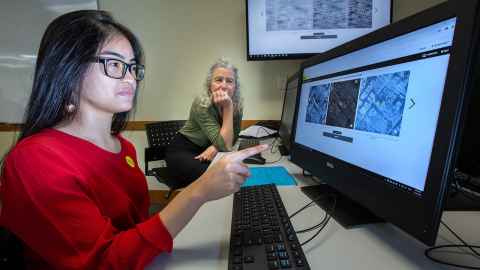Students track war crimes in Syria
10 December 2018
A chance to take part in an Amnesty International (NZ) investigation into possible war crimes in Syria was too good to pass up for University of Auckland students last week.

‘Strike Tracker’ is an online mass data-gathering tool which Amnesty is using to map the destruction of buildings in the Syrian town of Raqqa during a four-month period of bombardment in 2017.
University of Auckland Politics and International Relations lecturer Dr Tom Gregory set up a ‘war room’, in collaboration with Amnesty, where volunteer students became online decoders on Strike Tracker.
After a brief training exercise, they started analysing grainy satellite images of the destroyed city and pinpointing date ranges to work out when particular buildings were destroyed.
This data will help reveal a pattern of civilian deaths which will form the basis of an Amnesty report due out next year. The report hopes to raise awareness of the way the bombardment was carried out, to bring those responsible to account and to seek reparations and justice for survivors and their families.
It gave the students a feeling of having some power to make a difference in what would otherwise be beyond their control.
After the siege, which left 80 percent of the city’s buildings in ruins, Syrian Democratic Forces (SDF) – the US-led Coalition’s Kurdish partners on the ground – announced victory over Islamic State (IS),” says Dr Gregory.
“However, Amnesty believes the majority of the destruction in Raqqa was caused by the Coalition, which denies it. The Coalition doesn’t plan to compensate survivors and refuses to provide more information about the circumstances behind strikes that killed and maimed civilians.”
Dr Gregory says the well-attended war room event was a great way to bring the real world into the lecture room, and he wants to involve students in more experiences of this kind.
“It gave the students a feeling of having some power to make a difference in what would otherwise be beyond their control,” he says.
Amnesty’s community manager Margaret Taylor, who briefed students on Strike Tracker, says research is at the heart of Amnesty’s effectiveness.
“It’s why it’s great to draw on the time and talent of academics and students at the University of Auckland, whose studies give them a far sharper understanding of the reality of war than most.”
Participants in the war room were a mix of undergraduate and postgraduate students, some of whom are completing a Master of Conflict and Terrorism Studies in the Faculty of Arts.
Media queries
Julianne Evans | Media Adviser
Mob 027 562 5868
Email julianne.evans@auckland.ac.nz